🎵 You’re a grand old post, you’re a high-flying post
And forever in Substack you’ll staaaaaaay
You’re the emblem of
The jokes we love
The home of the puns of Broadwaaaaaaay
Every heart goes aflutter
For that popcorn butter
Which Basil gets one piece of at most
But should movie magic be forgot
Keep your eyes on this grand old post!🎵

Previews
What, if anything, did we know about this coming attraction before we watched it?
Ellen: Legend has it Yankee Doodle went to town riding on a pony, so, ipso facto, bing bang boom.
Tyler: If you’ve heard of this movie, you know more about it than I do.
Plots & Feelings
This one’s pretty self-explanatory.
Short Version (courtesy of IMDb): The life of the renowned musical composer, playwright, actor, dancer, and singer George M. Cohan.
Long Version (modified from Wikipedia and formatted to fit your screen):
Fresh off a performance playing President Roosevelt in a musical called I’d Rather Be Right1, former vaudevillian and Broadway star George M. Cohan receives a telegram from the very man he was parodying, requesting his presence at the
big house, I mean, the White House. George figures not even his quickfire patter dialogue can get him out of this, and he makes his way to Pennsylvania Avenue. The President asks to learn more about George, prompting one very long flashback…Tyler: The “quickfire patter dialogue” is like a 40s Sorkin movie with how quippy and tight it is. Surely they can’t keep this up the whole movie, right?
Some 60 years ago in a vaudeville theater in Rhode Island, Jerry Cohan is powering through one last number of his performance before fighting the Fourth of July2 crowds to get to his wife Nellie, who has just given birth to their first child! It’s a boy, and the couple takes half of the doctor’s suggestion to name him “George Washington,” and the world meets George M. Cohan. He’s raised in the theater from the jump, and as soon as his sister Josie is born, so is the family act: The Four Cohans. We’re treated to a montage of the family traveling the country and putting on performances. “They kept putting stars on the flag, and the Cohans kept rushing out to meet them,” as Narrator George puts it. Unfortunately, this tableau involves whole family blackface makeup and an advertisement for Josie as “America’s Youngest Skirt Dancer.”
Ellen: The “America’s Youngest Skirt Dancer” thing gives Toddlers in Tiaras vibes in the worst way.
Tyler: Honestly, The Four Cohans would’ve made a heckuva reality show on TLC.
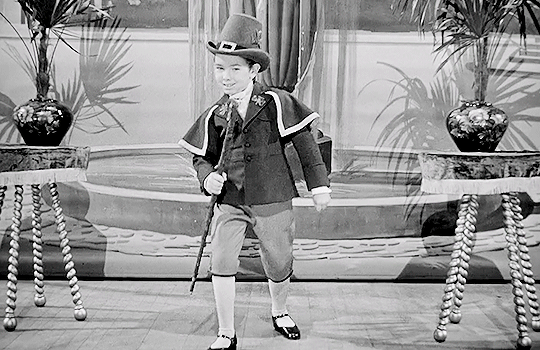
The family’s big break comes when they get a show in Brooklyn, starring thirteen-year-old George as Peck’s Bad Boy, who proclaims that he can whip any kid in town. He is absolutely insufferable about it, though some kids who beat him up after the show to see how bad he really is manage to put him in his place for about 10 minutes. His parents try to give him some friendly advice about leaving the acting on the stage and being normal about it. When a producer comes to the family dressing room to offer a contract George finds substandard, however, he ruins it for everyone by being an egotistical hothead, and the family goes back out on the road.
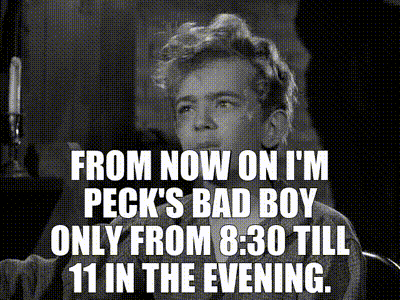
Years of touring go by, and eventually George is old enough to pretend to play his own mother’s father in shows! A young Broadway hopeful named Mary comes backstage to get advice from such a sage old soul, but she’s horrified to discover his silver beard and wrinkles come off! George gives her advice anyway, and she joins the company, in part as a vehicle for George to get his compositions performed on stage. They, uh, don’t exactly have the manager’s permission to change the set list, however, and instead of receiving a lucrative New York contract, the Cohans are fired! Even worse, George is blacklisted.
Ellen: Before they’re booted from this show, George gets to deliver a curtain call saying “My mother thanks you, my father thanks you, my sister thanks you, and I thank you!” Pretty cute.
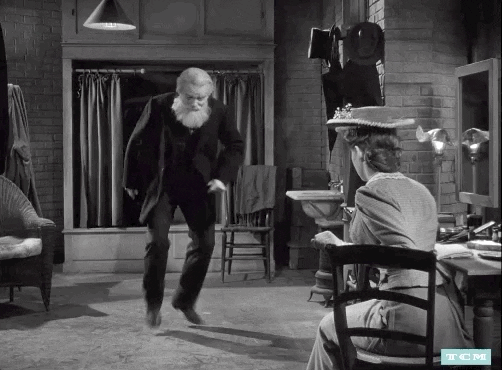
Unable to perform, George and Mary hawk his songs to various producers including the ever-bickering Dietz and Goff, but no one bites. The rest of his family can get work anytime they want, but their unwillingness to break up The Four Cohans relegates them to “Starvation Corner” in their boardinghouse. George manages a modicum of decency and tells them he’s got a musical in production, and the three of them can get out and do shows while he gets it ready for rehearsals! In an effort to make this lie a reality, George teams up with another struggling writer named Sam Harris, and together they convince a producer competing with Dietz and Goff to buy their as-yet nonexistent show. It eventually grows up to be Yankee Doodle Dandy, and it’s a patriotic Broadway smash!
Ellen: I’m really impressed by the stagecraft of this musical within the movie. There are creative ways to give the illusion of a horse race, a steamer ship, and fireworks!
Tyler: I was equally impressed with the fact that there were also actual horses on stage!
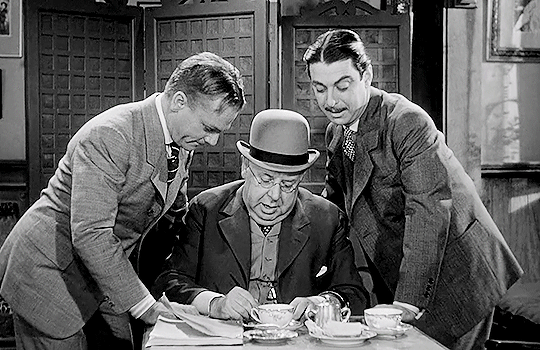
George brings his family in to participate in his burgeoning Broadway empire, and he and Harris set about bringing in a big star for their next show: Fay Templeton. She’s initially uninterested working on a flag-waving Cohan production. Her manager tries to convince her that ambition, pride, and patriotism is a magic trinity that will bring her huge success if she hitches her wagon to George’s star. What really convinces her is a sample of the song “Mary,” which George unveiled for his Mary earlier that evening. Faye loves it and how different it is musically, and Harris closes the deal. Back home, George arrives with flowers and candy for Mary, and just kind of slips in a marriage proposal that’s mostly about her caretaking him. She accepts, and lets him know she was one step ahead in knowing he gave away her song, and she loves him anyway.
Ellen: In another movie, George basically giving away Mary’s future career and hiding it in a proposal might have been cause for conflict, but not in this one!
Tyler: Perhaps in another movie that didn’t have direct involvement from the subject of the movie itself (Cohan served as an advisor). If this happened in real life, I can’t help but think that Mary wouldn’t take too kindly to that entire situation.
We receive a montage of various Cohan hits on Broadway, both tours and new shows. George insists his genius is just that he’s “an ordinary guy who knows what ordinary guys like to see.” As his star continues to rise, however, his family consciously decides to step back, with Josie getting married and the elder Cohans retiring to a farm. George shares his profits and rights to his shows with his father, but perhaps they regret it after his attempt at a “serious” play called Popularity is a stinker. But at least it’s not a sinker, as in the sinking of the Lusitania and the beginning of World War I! George attempts to enlist but is rejected for being too old, so he does his part with Army YMCA shows, where he debuts “Over There.”
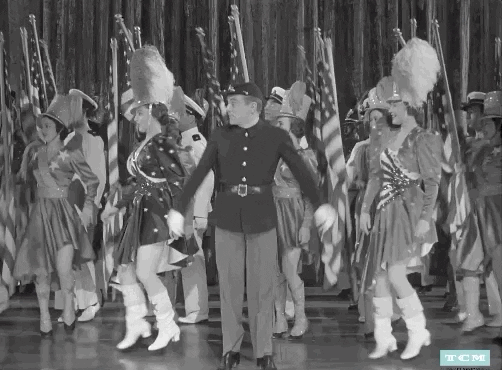
The war is over, and ten years go by in a blur of the neon lights of Broadway. George’s mother and sister die offscreen in the span of like two lines, but Dad gets a whole scene because he outlives them both! And probably also misogyny who can say. Anyway, George goes to see his father on his deathbed. Jerry isn’t 100% there, reminding George that he must never upstage his mother. George repeats that the whole family thanks him, and Jerry dies. George and Harris amicably dissolve their producing partnership, and George and Mary travel the world, shown to us through a series of travel stickers on luggage.
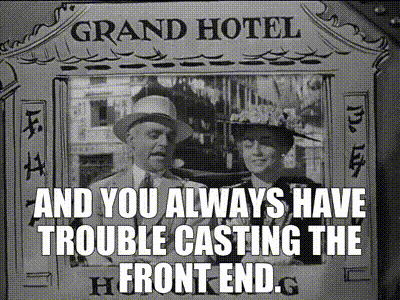
Later, Mary and George are retired at his parents’ country house, living a life of leisure. After an encounter with some teens who terrify him equally with not knowing who he is and singing “Jeepers Creepers,” George is forced to confront the fact that he’s not happy being retired. Thankfully, Mary went behind his back and talked to Harris about George leading his next show. And George reveals he was listening on the other line anyway, so no harm, no foul! Thus, his run as FDR in I’d Rather Be Right begins.
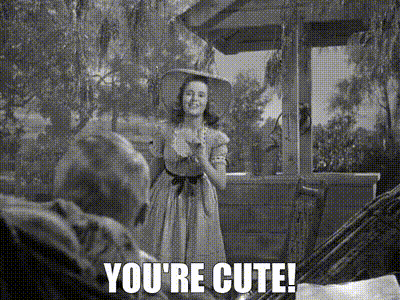
Back in the Oval Office, Roosevelt thanks George for his patriotic work. George incorrectly identifies the award as the Congressional Medal of Honor, but he’s the first guy in showbiz to get a Congressional Gold Medal anyway. George lets the President know that “my mother thanks you, my father thanks you, my sister thanks you, and I thank you.” As he leaves, George can’t resist a little tap dance down the stairs on his way out. Outside, he falls in with a military parade where the crowd is singing “Over There.” A soldier asks him why he’s not singing along, and George smiles and joins in.
Ellen: According to Wikipedia, Cagney thought up the dance down the stairs right before the scene and did it without rehearsal!
Tyler: I’m so glad there’s a gif of that because it is mesmerizing. Kudos to Cagney for such impressive improv!
Tyler: I also thought the final scene was a nice little contrast to earlier when he’s borderline incredulous that the teeny-boppers didn’t know who he was. Despite working his whole life to splash his name all over everything, he realized that his work is his legacy.
Ellen: And on a smaller level, that family was always at the core. I got chills at the “thank yous,” and Rule of Three strikes again!
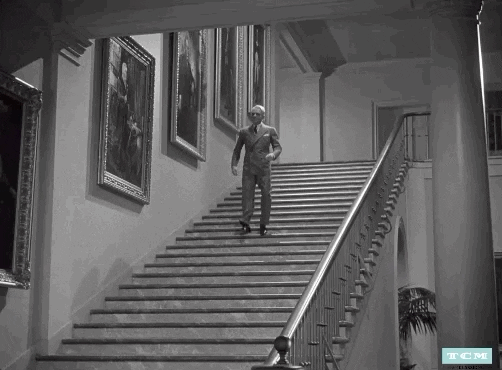
Intermission
Even though ILTBTA is free, please indulge us further and enjoy this quick “advertisement.”
This installment of ILTBTA is brought to you by … Dietz and Goff, Broadway Producers Extraordinaire!
Are you looking for the next unexpected Broadway show that comes at ya out of nowhere, written by some talented upstarts?? Then look elsewhere, idiots, that’s a money loser for sure! We here at Dietz and Goff specialize in the establishment. “No new friends,” as someone in the future embroiled in a losing beef might say, and our firm is committed to keeping the balance of creative power right where it belongs: with us.
Mention ILTBTA when you bring us your garbage script, and we’ll throw the script out first to break your fall!
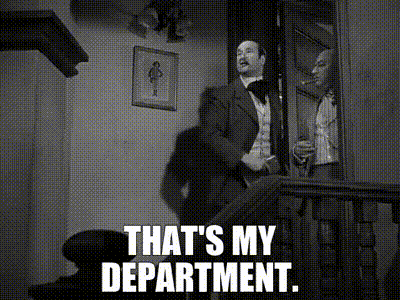
Wiki-Wiki-Whaaat?
Love a good Wikipedia rabbit hole in search of some fun facts? Us too.
Yankee Doodle Dandy’s Wikipedia page has some interesting facts and anecdotes that we recommend you read through, but here are a few of our favorites:
Based upon a cursory read of Cohan’s Wikipedia page, Yankee Doodle Dandy seemed to be a relatively3 accurate retelling of Cohan’s life, though there were a couple notable exceptions. For example, a baptismal certificate from a church in Providence, Rhode Island, where Cohan was born, actually indicates he was born on July 3rd, though he and his family always insisted he was born on the 4th. The character of Mary in the movie (in reality, the name of Cohan’s second daughter) seems to be an amalgamation of Cohan’s two wives: Ethel Levey (an actress and dancer who divorced Cohan for adultery after eight years of marriage) and Agnes Mary Nolan (a dancer in his early shows whom he remained married to until his death).
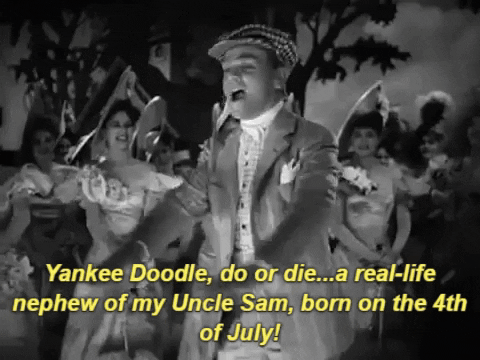
In 1930, Cohan won a legal case against the IRS that allowed the deduction (for the purposes of his federal income tax) of business travel and entertainment expenses, even though he couldn’t actually produce proper documentation. This then became known as “The Cohan Rule” and is often cited in tax cases.
Tyler: This one’s for our one subscriber who would find this fact interesting. You know who you are.
For his contributions to the theatre during his long and industrious career (he wrote over 50 shows and published more than 300 original songs), a bronze statue of Cohan was placed in Duffy Square at the northern end of Times Square. It is the only statue on Broadway of an actor.
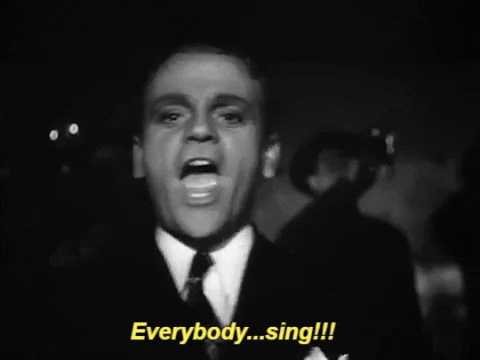
Yankee Doodle Dandy director Michael Curtiz directed a staggering 86 films over a 28-year period for Warner Bros. across a wide range of genres, including Westerns, musicals, horror, swashbuckling adventures, and dramas. He is best remembered for directing the classic movie Casablanca (which we gave an Honorable Mention to in our post on Gaslight and is considered by many, ourselves included, to be one of the best movies ever) and helping launch the acting careers of stars like Errol Flynn, Olivia de Havilland, and Bette Davis (our friend from Jezebel).
Curtiz had previously directed YDD star James Cagney four years prior in the acclaimed crime drama Angels with Dirty Faces, one of many times in which Cagney played a tough-guy gangster.
Ellen: If this rang a vague 90’s shaped bell for you too, you may be thinking of its parody Angels with Filthy Souls, which is the fake movie Kevin McAllister watches in Home Alone!
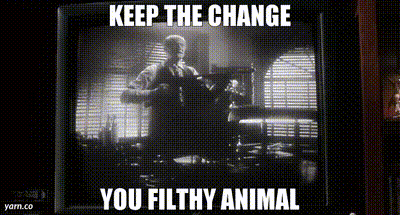
Cagney had originally been opposed to a biopic of Cohan due to Cohan’s backing of producers over actors during a labor strike in 1919. However, after Cagney and fifteen other Hollywood figures were accused of being Communists by testimony in front of the House Committee on Un-American Activities (which Cagney refuted), his brother (who produced YDD) is reported to have told him “We’re going to have to make the goddamndest patriotic picture that’s ever been made. I think it’s the Cohan story.”
Tyler: Yankee Doodle Dandy was a real Cagney Family affair: James’ sister Jeanne portrayed his character’s sister Josie Cohan.
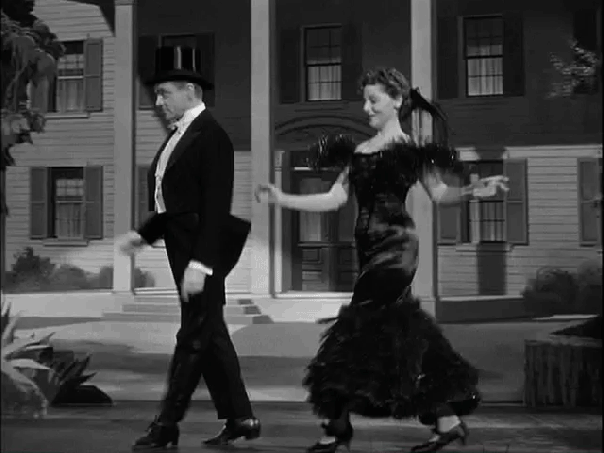
For what it’s worth, Cohan didn’t exactly want Cagney playing him either: as an advisor on the film, Cohan apparently made it quite well known that he preferred Fred Astaire (whom we met in Top Hat) to star in his life’s story. Astaire turned down the offer because Cohan’s “eccentric, stiff-legged dancing was far removed from Astaire’s own, more fluid, style.” (Cagney twice sprained an ankle trying to replicate this.) Nevertheless, after watching the completed film, Cohan noted of Cagney’s performance: “My God, what an act to follow!”
In a Hollywood tale as old as time, Rosemary DeCamp (who played Cohan’s mother) was actually eleven years younger than Cagney.
President Roosevelt was played by a lookalike actor named Captain Jack Young, while an impressionist named Art Gilmore provided FDR’s voice.
Tyler: I guess the extremely wooden delivery is at least historically accurate? I wonder if it would’ve been less distracting had I seen this when it came out having been more familiar with FDR’s actual voice, but my gosh was it noticeably flat to the modern ear.
Ellen: Especially in comparison to the rapid pace of Cagney, it was whiplash!
Fill In The Blank
How did we really feel about The Academy nominating this?
Ellen: I’d like to give away The Academy’s song while simultaneously proposing so that they’re not too mad about it. James Cagney is fantastic as George Cohan in this, and it looks absolutely exhausting. It’s no wonder he got his own Oscar for it. Despite some weirdness in the actual content, I also enjoyed George and Mary’s storyline, where they were playful with each other and seemed like they had an actual relationship, as opposed to the “say we’re in love after 20 minutes” trope. As I mentioned above, I also think the production value of the recreations of stage shows was really high, and I think there’s some fun filmmaking at play in the neon lights and travel sticker montages.
All that being said, when you dig into it, there’s not quite as much there. It’s a pretty decent biopic of a guy who was popular at the time, but I’m not totally convinced it was Best Picture-worthy. I’m also not surprised that the simplified, flag-waving patriotism feels at odds with modern tastes, where I’d prefer a message of loving America through continuous improvement, rather than “we’re perfect and the only thing left is to defend against the haters.” The latter attitude does, however, tie in with how George is presented - he’s right, everyone against him is wrong, and that’s it: that’s the conflict. They simplify the message down to “a regular guy who knows what regular guys like,” but it seems like it could be more than that. Fay’s manager does a decent job of explaining why people are attracted to George’s stories and we can clearly see his dance skills, but there are a couple of allusions to him doing something new and exciting musically and no real attempt to explain it. It comes up again when the kids are singing “Jeepers Creepers” and George appears physically in pain - I honestly can’t parse if it’s too much tell or too much show, but an attempt to go deeper and explain what he was doing musically would be appreciated (besides creating war anthems - that part’s easy to understand).
I’m shocked I had this much to say about a jukebox musical!
Tyler: I’d like to serenade The Academy with a mediocre version of “Grand Old Flag” while someone skillfully dances in the background. First and foremost, James Cagney gives an incredible performance that was not only worthy of his Best Actor Oscar win, but elevates what would otherwise be a mid-tier biopic musical into a Best Picture nominee. (Consider it the Bohemian Rhapsody of its time.) Between the dazzling dancing skills and the fact that he feels cast so against type for those used to seeing him only as a gangster, he was an impressive lead. One complaint I have about the movie overall, though, is the length of the musical numbers taken straight from the plays. This could’ve been a much tighter movie (or allowed for some sorely needed depth in other places) had they chopped the musical scenes down a bit. To compare it to another recent musical biopic, it’s like the other end of the spectrum from Maestro, which caught flak for not showing enough of Bernstein at work. Like Ellen said, if we’re going to basically sit through entire productions of his songs, I would’ve appreciated more insight into what made them so revolutionary and different.
My complaints aside, when put in historical context (which is often the hardest part for us, I think), I understand why this movie did so well at the box office and was so well-received. I imagine it was exactly the kind of blindingly patriotic movie that the country wanted after Pearl Harbor (which occurred six months after it was released). I mean, Cohan embodies America: he’s born into an immigrant family, worked his way up, had quite the ego/level of self-confidence/bravado, told the haters to fuck off, and leaned hard on patriotism. He’s an AR-15 short of filling out his American bingo card. If nothing else, YDD is a reminder that some of our nation's most patriotic songs are absolute earworms because I haven't heard some of these since elementary school but still remember all the words.
I’ll also take this opportunity to plug Unspooled, a movie podcast by film critic Amy Nicholson and actor/comedian Paul Scheer. Their episode on Yankee Doodle Dandy was a great conversation and helped put words to my scattered thoughts about this movie.
Let The Credits Roll
Thanks for reading! Some quick housekeeping as you exit the theatre:
If you have plots and feelings of your own (on the movie or ILTBTA in general), feel free to comment on the post or simply reply to the email. If you liked reading this: tell your friends! If you hated reading this: tell your friends how much you hated it by forwarding it to them!
If you’re a weirdo like Tyler and use the social media site formerly known as Twitter, feel free to follow us there @BlankTheAcademy for ILTBTA updates, rejected jokes, and other random movie-related musings. Once we reach a million followers, we’ll offer to purchase the @ILTBTA handle from the butthead who snagged it before us.
ILTBTA is also on Letterboxd, the social networking site for movie fans. Follow us there to read our Spreadsheet comments of our ILTBTA movies, plus our ratings of other movies we watch!
If you’d like to start a wild Best Picture journey of your own, feel free to download a copy of The Spreadsheet. Bonus: checking off the boxes is oddly satisfying.
Post-Credits Scene
Get a sneak peek at the next ILTBTA installment.
Put your phones away and light a candle, because for our next ILTBTA post we’re going to Amish country with 1985’s Witness. A crime thriller starring Harrison Ford, Witness follows a police detective who tries to protect an Amish boy who witnesses (get it? Like the title?) a murder. You can witness this movie for free on Pluto TV or rent it from pretty much everywhere else.
Until then, …
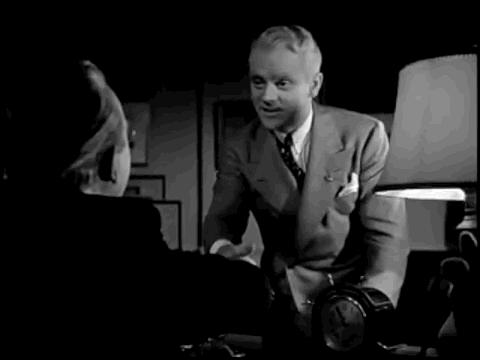
Sounds like my ex-wife!
Not to be confused with the other Born on the Fourth of July.




